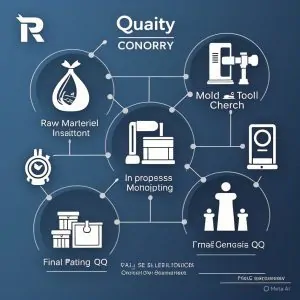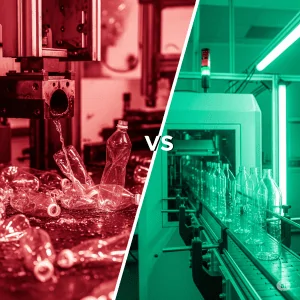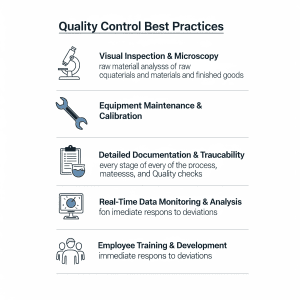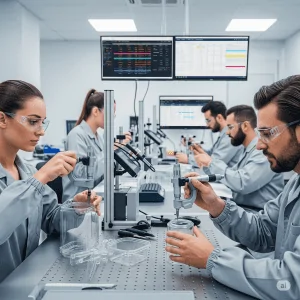+92 336 0875171

In plastic manufacturing, meeting quality standards isn’t optional—it’s vital. Effective plastic manufacturing quality control ensures that every product adheres to design specifications, safety guidelines, and brand expectations. Whether producing cosmetic containers, food-grade bottles, or industrial components, QC:
Reduces product defects and rework
Safeguards customer satisfaction and brand reputation
Ensures compliance with regulatory standards (like FDA, ISO)
Minimizes waste and decreases production costs
By integrating quality assurance plastic manufacturing early in the process, manufacturers can avoid costly mistakes down the line.
Without solid QC practices, manufacturers face serious risks:
Product recalls and customer returns: One bad batch can affect thousands of units.
Safety hazards: Leaky containers or structural failures cause accidents.
Reputation damage: One negative review ruins credibility—especially in B2B markets.
Regulatory violations: Non-compliance can lead to legal penalties and loss of certifications.
Higher operating costs: Waste, scrap, and troubleshooting inflate expenses.

| QC Stage | Purpose | Common Tools |
|---|---|---|
| Raw Material Inspection | Verify resin specifications and batch consistency | Certificates, lab testing |
| Mold & Tool Inspection | Ensure mold precision and alignment | 3D scanning, mold flow analysis |
| In-Process Quality Monitoring | Detect defects during production | Real-time sensors, SPC software |
| Dimensional & Visual Inspection | Confirm size accuracy and surface finish | Calipers, micrometers, visual checks |
| Functional/Pressure Testing | Ensure containers meet performance specs | Compression, leak, and drop testers |
| Packaging & Shipping QC | Prevent post-production damage | Seal integrity tests, transit simulation |
Visual Inspection for Defects: Catch cracks, discoloration, warping, and other issues early.
Dimensional Testing: Use instruments like digital calipers and micrometers to verify measurements.
Functional Testing: Confirm containers hold liquid, resist pressure, and maintain seals.
Statistical Process Control (SPC): Monitor production trend data to safeguard consistency.
Automated Vision Systems: High-throughput inspections with flaw detection capabilities.

Establish clear quality benchmarks for dimensions, appearance, and performance.
Train your team in standard operating procedures (SOPs) for inspections.
Use automated monitoring tools to catch issues early and reduce human error.
Document every QC check with digital logs and timestamped reports.
Run continuous process audits and update standards when issues arise.
Maintain equipment and regularly recalibrate tools to ensure accuracy.

At Noor Enterprises, quality isn’t a phase—it’s a commitment. With a four-tier QC system, they:
Vet raw materials thoroughly
Calibrate molds using 3D scans
Monitor production with SPC and AI vision tools
Validate packing integrity and distribution resilience
Their approach is fully ISO-compliant and built on real-time data and continuous improvement. It supports brands that rely on precision—for sectors ranging from food safety to cosmetics.
Boosts Customer Confidence: Predictable, reliable products lead to repeat business.
Reduces Waste and Costs: Catch issues early before they escalate.
Meets Industry Standards: Compliance with regulations opens new markets.
Supports Premium Pricing: Customers pay more for assured quality.
Speeds Time-to-Market: Streamlined QC keeps production flowing, not halted.

Plastic manufacturing quality control isn’t just good practice—it’s essential for scalability, reputation, and profitability. A strategic QC program cuts defects, improves efficiency, and strengthens compliance—all while building brand trust.
If you’re making plastic packaging or components, don’t leave anything to chance. Noor Enterprises can help you guarantee precision, performance, and excellence—from material sourcing to final QA.
📞 Contact Noor Enterprises today for a free audit and a plan tailored to your production needs.
